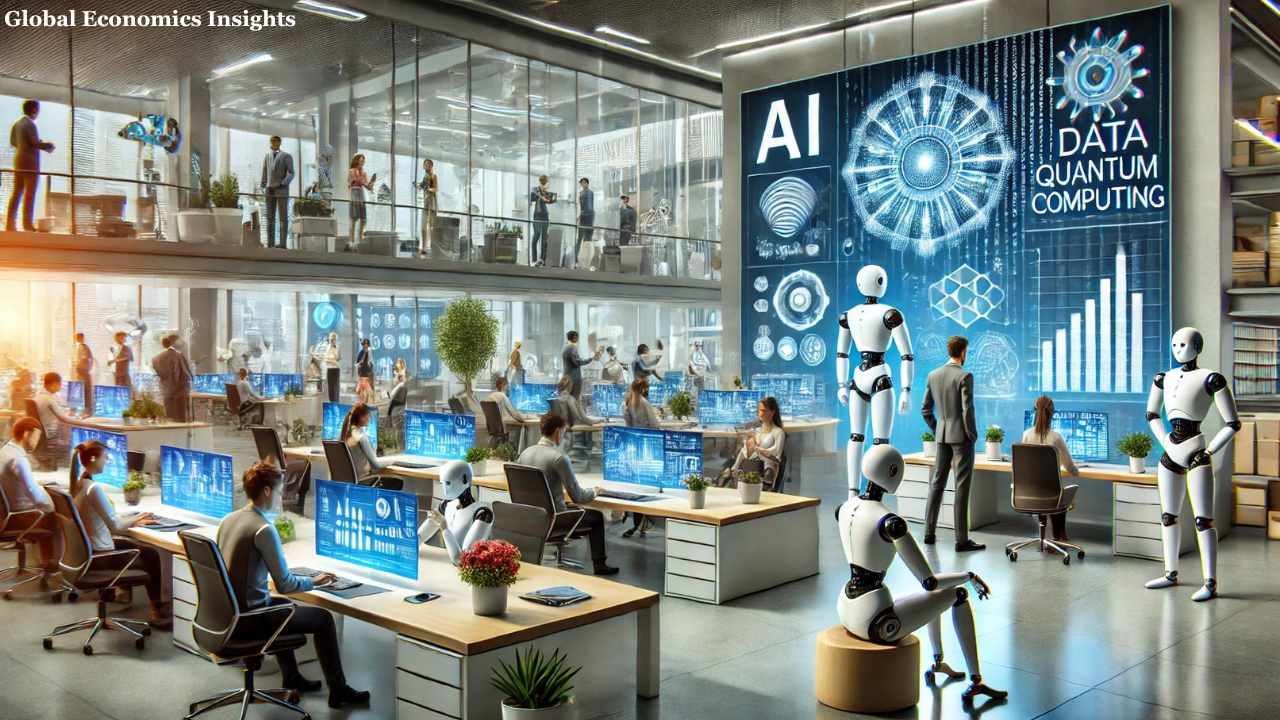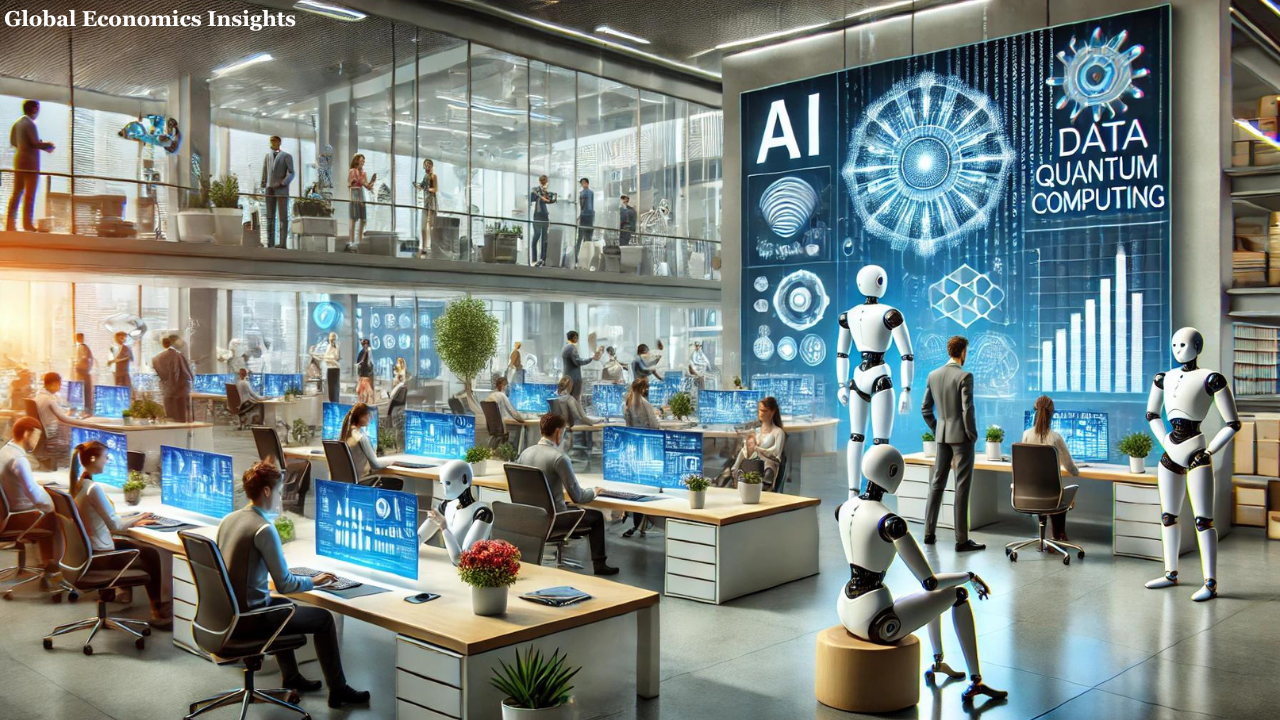As technological advancements continue to accelerate, the future of work is being dramatically reshaped by data and AI tech alongside quantum computing. These innovations are not only enhancing productivity but also creating new opportunities and challenges for businesses and workers. Understanding how these technologies intersect is crucial for navigating the evolving landscape of work.
The Role of Data in the Modern Workplace
Data-Driven Decision Making In today’s business environment, data-driven decision-making has become essential. Companies are leveraging vast amounts of data to make informed decisions, optimize operations, and stay competitive. This approach allows businesses to identify trends, understand customer behavior, and predict future outcomes with greater accuracy.
For example, retail giants like Amazon utilize big data analytics to personalize shopping experiences and manage inventory. By analyzing customer preferences and purchasing patterns, they can predict demand and adjust stock levels, minimizing waste and maximizing profits.
Big Data and Workforce Management The impact of big data extends to workforce management as well. By analyzing employee performance data, businesses can identify high performers, predict potential turnover, and tailor training programs to individual needs. This data-driven approach enhances employee satisfaction and boosts overall productivity.
For instance, companies like IBM have developed AI-powered tools that analyze employee data to provide insights into career development opportunities. These tools help managers make informed decisions about promotions, training, and retention strategies.
Artificial Intelligence: Revolutionizing Job Roles
AI and Automation The rise of artificial intelligence is transforming job roles by automating repetitive and mundane tasks, allowing employees to focus on more strategic and creative work. AI and automation are prevalent in industries like manufacturing, where robots powered by AI tech perform tasks with precision and speed.
However, AI’s revolution in the workplace extends beyond automation. In the financial sector, AI algorithms analyze vast amounts of data in real-time, providing insights that were previously unattainable. For instance, AI-driven trading systems can execute trades at lightning speed, capitalizing on market opportunities with minimal human intervention.
AI-Augmented Workforces Artificial intelligence tools are not just replacing human labor; they’re also augmenting it. AI-augmented workforces are increasingly common across various sectors, where AI-powered tools enhance human capabilities, making workers more efficient and productive. In healthcare, for example, AI diagnostic tools assist doctors in detecting diseases earlier and more accurately than ever before.
This symbiosis between AI and human workers leads to better service and higher customer satisfaction. In customer service, AI chatbots handle routine inquiries, freeing up human agents to tackle more complex issues.
Quantum Computing: The Next Frontier in Technology
Quantum Computing Explained Quantum computing is poised to revolutionize how we process information. Unlike classical computers, which process data in bits (0s and 1s), quantum computers use qubits that can exist in multiple states simultaneously. This enables quantum computing to perform complex calculations at unprecedented speeds.
The potential applications of quantum computing are vast, from drug discovery to climate modeling. In drug discovery, for example, quantum algorithms can simulate molecular interactions with a scale and accuracy impossible for classical computers, potentially leading to faster development of new drugs and treatments.
Quantum Computing in AI The synergy between quantum computing and AI tech holds incredible potential. Quantum AI could dramatically speed up the training of AI models, enabling more sophisticated and accurate predictions. For instance, Google’s TensorFlow Quantum project is exploring how quantum computing can develop more powerful AI models, solving complex problems more efficiently.
Industry Applications of Quantum Computing Quantum computing is already being explored in various industries. In finance, quantum algorithms optimize investment portfolios and manage risk more effectively. In logistics, quantum computing could revolutionize supply chain management by optimizing delivery routes in real-time.
The healthcare industry also stands to benefit from quantum computing. By analyzing large datasets of patient information, quantum computers could help identify patterns and correlations invisible to classical computers, leading to earlier diagnoses and more personalized treatments.
The Synergy of AI and Quantum Computing
The true potential of AI tech and quantum computing lies in their synergy. Combined, these technologies can solve problems beyond the capabilities of classical computers. This synergy could lead to breakthroughs in fields such as cybersecurity, where quantum-powered AI systems could develop unbreakable encryption methods.
In climate science, quantum AI models could provide more accurate predictions of climate change, helping policymakers make better-informed decisions. The possibilities are endless, and as these technologies continue to evolve, their impact on the workplace will only grow.
Conclusion
The future of work is being shaped by data, AI tech, and quantum computing. These technologies are not just changing how we work but also creating new opportunities and challenges. By embracing these innovations and understanding their implications, businesses and workers can better prepare for the future and remain competitive in an increasingly digital world.
In conclusion, staying informed and adapting to these technological advancements will be key to thriving in the future of work. As AI tech and quantum computing continue to develop, their impact on the workplace will be profound, ushering in a new era of productivity and innovation.


